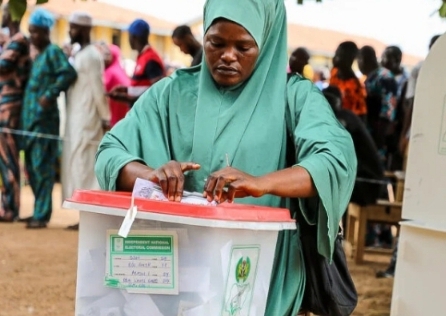Yiaga Africa has condemned the proposed bill that seeks to make voting compulsory in Nigeria, labelling it a “draconian” piece of legislation that infringes on constitutionally protected rights and democratic freedoms.
A statement released on Thursday by Samson Itodo, the executive director of Yiaga Africa, called on the National Assembly to reject the bill, which has already advanced to the second reading in the House of Representatives.
The bill, introduced by Tajudeen Abbas, the Speaker of the House of Representatives, suggests a six-month custodial sentence for eligible voters who do not participate in elections — a strategy that Yiaga Africa argues is both punitive and unproductive.
“Yiaga Africa categorically rejects the proposed bill before the National Assembly that aims to introduce compulsory voting in Nigeria, along with a six-month custodial sentence for eligible voters who refuse to cast their votes,” the statement asserts.
“The bill is intended as a legislative attempt to address the shockingly low voter turnout.
“While the rationale behind the bill is commendable, as it seeks to confront one of the most pressing challenges in Nigeria’s electoral system, the authoritarian approach adopted by the bill is draconian and constitutes a serious violation of constitutionally guaranteed fundamental rights.”
Itodo remarked that abstaining from voting is a valid form of political expression, protected by both domestic and international human rights laws.
He further indicated that the bill does not tackle the underlying systemic issues contributing to Nigeria’s declining electoral participation.
“Voter turnout in Nigeria has seen significant fluctuations over the years, reflecting a complicated interplay of political and systemic factors that affect electoral engagement,” the statement elaborates.
“In 1979, turnout was recorded at 34.6%, slightly increasing to 38.9% in 1983 and stabilising at 35% in 1993.
“A significant rise occurred in 1999, with turnout reaching 52.3%, followed by a peak in 2003 when 69.1% of registered voters participated.
“However, this upward trend declined in subsequent elections: 57.5% in 2007, 53.7% in 2011, 43.7% in 2015, 34.7% in 2019, and a historic low of 27.1% in 2023.”
Yiaga Africa has urged lawmakers to shift their focus from punitive measures to electoral reform, including the restoration of public trust, ensuring transparency in elections, and eliminating barriers to participation.
The civil society organisation has suggested alternative reforms such as electronic transmission of results, voting for the diaspora, early voting, and a transparent process for the appointment of officials within the Independent National Electoral Commission (INEC).
“Democracy thrives on freedom, which encompasses the choice to participate or abstain from voting. Compulsory voting undermines this democratic freedom, and the punitive measures for failing to vote compromise the fundamental principles of voluntary democratic engagement,” the statement concluded.
“Rather than enforce compulsory voting, the National Assembly should focus on electoral reforms that rebuild public trust, enhance election integrity, and eliminate structural and systemic barriers to participation.
“Yiaga Africa asserts that voter apathy cannot be remedied by imposing penalties for non-participation. It can be addressed through trust, electoral justice, and accountability.
“We therefore implore the National Assembly to reject the proposed bill and direct its legislative efforts towards enacting electoral amendments that broaden access to voting, guarantee electoral transparency, and safeguard the political rights of all Nigerians.”










